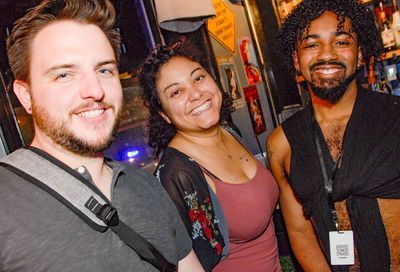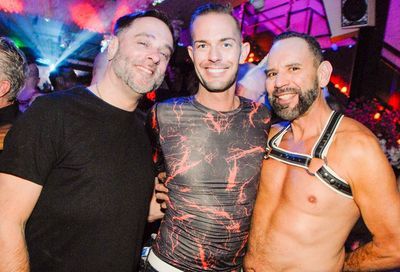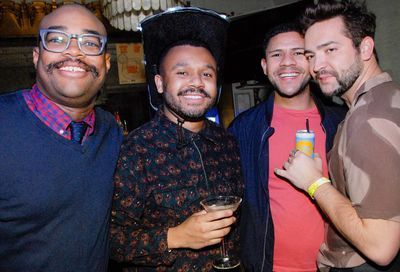OutWrite 2019: ‘Rivers, Lament’ by Marcos Martinez
An excerpt from Embarkations (or, Boating for Beginners), a novel-in-progress
By Marcos Martinez
August 1, 2019

If you follow the Potomac up to where it feeds and is fed by the Chesapeake Bay, you might hear a tale of some wandering wailer, someone who’s lost a thing they held dear. Because every river has a soul. They say sometimes this soul gets split, gets fractured into rivulets, tributaries, seasonal runoff. Sometimes this soul gets flailed and flayed and floundered into lost streams. Sometimes it’s people that split a river’s soul, by naming and renaming, flinging words like spit to see what catches hard and mean and true. To see what sticks.
It unfurled as these tales often do: a flung stone of discovery skipping across the surface yet rippling and troubling the depths of home waters, causing waves and wakes of consequence.
Norah Bywater stood by the skiff on the shore and told her husband, Jonah Jr.:
“I’ve done seen what you’re up to.”
The bay lulled unseasonably calm while Norah’s heart thundered as she recollected:
A glint of sunlight flinted from Jonah Jr.’s gold wedding band onto a bright silver grappling hook hanging from a rafter in the shed. This glint drew Norah’s eyes down, down from wood beams to the thick solid stance of her husband next to his trawl-mate, Wally. And it wasn’t even their proximity that troubled her. Weren’t even their stoic shoulders hunched towards one another like trestles waiting to meet but forever kept apart and at bay by beams and bridges and breaches.
No. What stuck in her craw — what kept Norah restless deep into dawn for nights on end — was the sight of her husband’s fingers woven into Wally’s, the need and hunger and ache of bodies wrestling and wrangling into one another that spelled itself out in their hands grappling and roping and braiding. Jonah and Wally. Knotting into one another. She could see whole bodies in the way the morning sunlight slicked and shimmered off the hair on their knuckles and wrists. Wally and Jonah. The way their stubble clashed and scraped as their cheeks and lips grazed each other.
Gold upon gold upon copper and bronze: Jonah’s tan and freckled fingers clashing against Wally’s darker sunbaked hand; Wally’s charcoal mustache stiffening and tangling into Jonah’s copper filament bristle. The sight of it all blinded Norah, unsteadied her, upended her. And in that moment — light glimmering from ring to wrists to hook — all those overnight fishing trips, campouts, and nights when Jonah would stagger in smelling a little like Jack Daniels, a little like himself, and a little like something muskier and heavier — not rank or sour as dredge, but guilty with silt — those nights coalesced into something stranger and more worrisome than any riversurge could be.
Norah’s waters became troubled, riotous.
Her waters crested, then stilled.
“I’ve seen it, and there’s no denying. Just you and him keep it away from me. Keep away from my son.” Because she had Artemio — Temo — to protect, to shield. And no trawlers, fishing folk, or crabbers would shift her boy the way these two pesky perch floundered and wiggled towards one another. No son of hers would be kin to all that fishy business. No son of hers. No heart of hers.
And if Jonah was silent before — quiet and steady as the flat grey calm of waters before a clap of thunder — then he grew more silent still. Said nothing: no complaint, no defense.
So Norah gathered herself in, forced herself to fall fallow, witnessed her own red riverbed blow dry and dusty and cracked. Her husband could have his pleasure elsewhere, she figured. She didn’t need any touch of her own. But the years weighed and stretched and parched in around her. She hungered for a riverraised fish like a river hungers for its bed. Still nothing wended its way into her: no man, no joy, no life. She thought about taking her son out into the water, sinking it all, but only skimmed past the idea, knew she could never let go of her boy, her blood, her truth.
Temo grew from 7 to 13. The dry heave of sorrow eclipsed Norah as her barrenness settled in. She drew scorn, plain old scorn, into herself. Then she led Jonah out onto the water just once more.
“Once more,” she said. “Like you used to take me, before we had Temo.” Before she’d lost their second baby. Before Wally troubled their waters. Shortly after she’d found them out, barred Wally from her porch, Temo had asked her, “Why can’t I see Uncle Wally?”
“Because. You just can’t. Besides, he isn’t even your uncle. Heck, his name’s not even Wally.” She’d muttered this last bit under her breath: Guadalupe, she’d thought, a woman’s name. Figures. She still crunched the thought like gravel under tires, even now as she coaxed her husband toward the dock.
“To Keel Island, out on the bay,” she told Jonah. A glint of tenderness shimmered through her voice, a light brightness she’d denied him these past few years. “Just us, so I can remember.”
He acquiesced, not figuring the fierce angle of her heart — all sleek and sharp like a fish-gutting knife — not imagining the serrated anger she kept buried inside her. As their boat trolled along the bay, the motor thrusting up against water and wind, halfway to Keel, at the deepest part of that slip of the cove: “Look,” she said, “is that Temo? Skirting into the water?”
Jonah turned, glanced sidelong past Norah’s shoulder. She lifted a pinewood oar from the bowels of their tiny boat and swung the oar around, back onto his neck, the oar’s arm cracking against his spine while the long, wide curve of the blade struck her husband’s skull and stunned him dead even, sent him flailing overboard.
Jonah lurched up against the water, but the tiller swung rogue. The boat circled round and round. As he surfaced, his head smacked the motor. Another concussion. Round and round: from there all it took was a push and a shove and it was over. Jonah was over and churned.
As Norah motored back to shore, there stood Temo, lone and still as he watched his mother approach the barren dock alone.
Had she tied a chain to Jonah’s ankles, weighed him down into the murkiest depths of the Chesapeake Bay? She couldn’t remember. A boating accident, she told the authorities. Can’t understand what happened, she murmured. Of course, they figured, an accident. Couldn’t imagine this tiny woman bringing harm to her strapping husband. Couldn’t perceive that the strength of women sometimes wells up from something deeper than love or loyalty, something rottener and more ruinous than distrust, something as turbulent and villainous as vengeance.
But Temo knew. Or knew well enough. Knew that his Dad hadn’t simply abandoned him. Knew enough to tell Uncle Wally, “The water’s took him.”
And they say a man wailed that night, long and hard, bellowed over, into, and under the water. That he remembered how his cousin, Alma La Llorona, had wandered restless along rivers. So Wally searched and skulked along the bay, followed its rivulets and streams and rivermouths in hopes of finding what he’d lost. He waved farewell to Temo, then went lunging south, following rivers and creeks, looking for Jonah Bywater Jr.’s bones, beckoning each waterway to ferry him home to his lost love.
No river ever answered.
So Guadalupe Calletano drove further south, even, back to his roots, back to El Río Bravo del Norte that delivered him. Because it was said his mother shuddered him with contractions, began birthing him on El Puente Nuevo, then crowned him in the river — and that in this delivery Esperanza Calletano had split her soul apart. In that lost midmost space between Mexico and Texas, Matamoros and Piedras Prietas, that no-man’s-land that marks the middle of the ever-shifting Rio Grande, one soul was drowned while another soul surfaced.
But who can ever mark a place in water?
They say he was a creature of two countries, citizen of none by birth, by birth merely the river’s son left floundering. And Wally (this child of water) later married and raised a family all his own.
But unto his death, my Uncle Caine Lance Calletano remembered hearing his grandfather some nights, weeping down by the river, wailing. Calling after his drowned lover Jonah:
“Amor, amor! Perdido!”
Rivers, Lament was first published in Pilgrimage Journal, volume 42 issue 1, Colorado State University — Pueblo. For more information on Marcos L. Martinez, visit www.stillhousepress.org.
Support Metro Weekly’s Journalism
These are challenging times for news organizations. And yet it’s crucial we stay active and provide vital resources and information to both our local readers and the world. So won’t you please take a moment and consider supporting Metro Weekly with a membership? For as little as $5 a month, you can help ensure Metro Weekly magazine and MetroWeekly.com remain free, viable resources as we provide the best, most diverse, culturally-resonant LGBTQ coverage in both the D.C. region and around the world. Memberships come with exclusive perks and discounts, your own personal digital delivery of each week’s magazine (and an archive), access to our Member's Lounge when it launches this fall, and exclusive members-only items like Metro Weekly Membership Mugs and Tote Bags! Check out all our membership levels here and please join us today!
The Magazine
-
Most Popular
 Aaron Rodgers Suggests AIDS Was Created by U.S. Government
Aaron Rodgers Suggests AIDS Was Created by U.S. Government  LGBTQ Websites Could Be Sued Under Kansas Anti-Porn Law
LGBTQ Websites Could Be Sued Under Kansas Anti-Porn Law  Maulik Pancholy Responds to School District Canceling Him
Maulik Pancholy Responds to School District Canceling Him  Grindr's New Feature "Roam" Connects Users Around the Globe
Grindr's New Feature "Roam" Connects Users Around the Globe  Star Trek Discovery's Wilson Cruz Keeps Making Television History
Star Trek Discovery's Wilson Cruz Keeps Making Television History  Mississippi Man Accused of Slaughtering Ex-Boyfriend
Mississippi Man Accused of Slaughtering Ex-Boyfriend  Biden's New School Rules Protect LGBTQ Students
Biden's New School Rules Protect LGBTQ Students  DC Black Pride 2024: Everything You Need to Know
DC Black Pride 2024: Everything You Need to Know  Turning 'The Outsiders' Into a Musical Was a Mistake (Review)
Turning 'The Outsiders' Into a Musical Was a Mistake (Review)  Conservative Ad Makes Case for Transgender Rights
Conservative Ad Makes Case for Transgender Rights
 Maulik Pancholy Responds to School District Canceling Him
Maulik Pancholy Responds to School District Canceling Him  Biden's New School Rules Protect LGBTQ Students
Biden's New School Rules Protect LGBTQ Students  School Board Cancels '30 Rock' Star's Anti-Bullying Talk
School Board Cancels '30 Rock' Star's Anti-Bullying Talk  Aaron Rodgers Suggests AIDS Was Created by U.S. Government
Aaron Rodgers Suggests AIDS Was Created by U.S. Government  LGBTQ Websites Could Be Sued Under Kansas Anti-Porn Law
LGBTQ Websites Could Be Sued Under Kansas Anti-Porn Law  HRC's Kelley Robinson Makes the Time 100 List
HRC's Kelley Robinson Makes the Time 100 List  Grindr's New Feature "Roam" Connects Users Around the Globe
Grindr's New Feature "Roam" Connects Users Around the Globe  Kansas Governor Vetoes Trans Health Care Ban
Kansas Governor Vetoes Trans Health Care Ban  Court Blocks West Virginia Trans Athlete Ban
Court Blocks West Virginia Trans Athlete Ban  DC Black Pride 2024: Everything You Need to Know
DC Black Pride 2024: Everything You Need to Know
Scene
Metro Weekly
Washington's LGBTQ Magazine
P.O. Box 11559
Washington, DC 20008 (202) 638-6830
About Us pageFollow Us:
· Facebook
· Twitter
· Flipboard
· YouTube
· Instagram
· RSS News | RSS SceneArchives
- "We use cookies and other data collection technologies to provide the best experience for our customers. You may request that your data not be shared with third parties here: "Do Not Sell My Data
Copyright ©2024 Jansi LLC.







